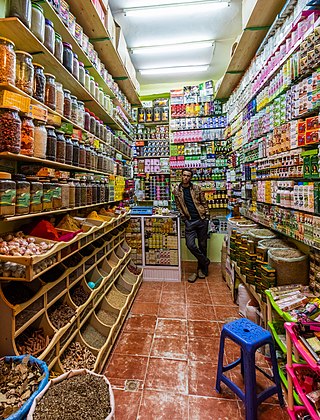
Retail is the sale of goods and services to consumers, in contrast to wholesaling, which is the sale to business or institutional customers. A retailer purchases goods in large quantities from manufacturers, directly or through a wholesaler, and then sells in smaller quantities to consumers for a profit. Retailers are the final link in the supply chain from producers to consumers.

Best Buy Co., Inc. is an American multinational consumer electronics retailer headquartered in Richfield, Minnesota. Originally founded by Richard M. Schulze and James Wheeler in 1966 as an audio specialty store called Sound of Music, it was rebranded under its current name with an emphasis on consumer electronics in 1983.
Dixons Retail plc was one of the largest consumer electronics retailers in Europe, which merged with Carphone Warehouse in 2014 to create Dixons Carphone, which was renamed Currys plc in 2021. In the United Kingdom, the company operated Currys, Currys Digital, PC World, Dixons Travel and its service brand Knowhow.

The Warehouse Group (TWG) was established by Stephen Tindall in 1982 and is the largest retail group in operation in New Zealand. It is a corporate conglomerate that consists of The Warehouse, Warehouse Stationery and Noel Leeming.
Dixons was a British high-street retailer of consumer electronics, originally founded in 1937 as a photographic studio by Charles Kalms. The company would later deal in many consumer electronics, with nationwide outlets in the United Kingdom and Ireland.

PC World was a British retail chain of mass market computer megastores. Established in November 1991, it became part of Dixons Retail in February 1993, and then part of Dixons Carphone, after the merger of Dixons Retail and Carphone Warehouse in August 2014.

Currys is a British electrical retailer and aftercare service provider operating in the United Kingdom and Ireland, specialising in white goods, consumer electronics, computers and mobile phones.

MFI Group Limited was a British furniture retailer, operating under the MFI brand. The company was one of the largest suppliers of kitchens and bedroom furniture in the United Kingdom, and operated mainly in retail parks in out of town locations. Anecdotally, it was said at one stage that one in three Sunday lunches in the United Kingdom were cooked in a kitchen from MFI, and 60% of British children were conceived in a bedroom from MFI.

The Link was an internet based mobile phone and communications retailer in the United Kingdom. It was owned by Dixons Retail, the United Kingdom's largest consumer electronics retail group, and traded online through a dedicated retail website, which in addition to mobile phones also offered satellite navigation systems and broadband Internet services.

Comet Electricals Limited, trading as Comet, is an online electrical retail chain based in the United Kingdom. The company sells consumer electronics and white goods, along with related products and services. Its predecessor, under the same brand name, pioneered the concept of the out-of-town discount warehouse in the United Kingdom.

JB Hi-Fi Limited is an Australian consumer electronics retail company. It is publicly listed on the Australian Securities Exchange. Its headquarters are located in Southbank, Melbourne, Victoria.

Silo was an electronics retailer operated throughout the United States between 1947 and 1995. The western region stores were known for a number of years as "Downings" in Colorado and "Appliance-TV City" in Arizona and California.
Fretter was an electronics and major appliance retailer based in Detroit, founded in the 1950s by Oliver "Ollie" Fretter.

Poundland Limited is a British variety store chain founded in 1990. It once sold most items at the single price of £1, including clearance items and proprietary brands. The first pilot store opened in December 1990 following numerous rejections by landlords who had reservations about allowing a single-price store to operate, fearing it could adversely affect the local competition. An estimated 7 million customers shopped in Poundland every week in 2016, many being female shoppers in the C1, C2, D and E categories. Following a drop in share price of over 50%, Poundland was acquired in August 2016 by Steinhoff International for £610 million.
Krazy Krazy Audio Video Warehouse was a Canadian retailer of consumer audiovisual electronics. In operation from 1983 to 2009, the chain began to decline in the late 1990s and 2000s due to the changing consumer electronics market. Although no longer operating as a national chain, a few former franchise locations remain in business as independently operated local stores.
Caversham Finance Limited, trading as BrightHouse, was the largest rent-to-own company in the United Kingdom, with 240 stores. It was a national chain that provided home electronics, domestic appliances, household furniture, other related products on a hire purchase agreements. Cash loans were offered towards the end of the company's existence.
Reliance Digital is an Indian consumer electronics retailer. It is a subsidiary of Reliance Retail, a wholly owned subsidiary of Reliance Industries.

Currys plc is a British multinational electrical and telecommunications retailer and services company headquartered in London, which was formed in 2014 by the merger of Dixons Retail and Carphone Warehouse Group. It is listed on the London Stock Exchange and is a constituent of the FTSE 250 Index.
The retail format influences the consumer's store choice and addresses the consumer's expectations. At its most basic level, a retail format is a simple marketplace, that is; a location where goods and services are exchanged. In some parts of the world, the retail sector is still dominated by small family-run stores, but large retail chains are increasingly dominating the sector, because they can exert considerable buying power and pass on the savings in the form of lower prices. Many of these large retail chains also produce their own private labels which compete alongside manufacturer brands. Considerable consolidation of retail stores has changed the retail landscape, transferring power away from wholesalers and into the hands of the large retail chains.













